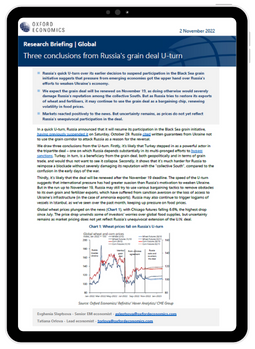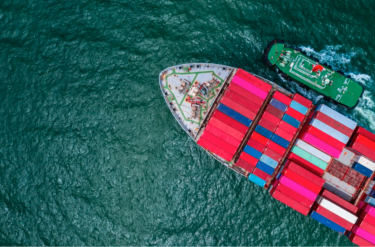Three conclusions from Russia’s grain deal U-turn

Russia’s quick U-turn over its earlier decision to suspend participation in the Black Sea grain initiative suggests that pressure from emerging economies got the upper hand over Russia’s efforts to weaken Ukraine’s economy.
What you will learn:
- We expect the grain deal will be renewed on November 19, as doing otherwise would severely damage Russia’s reputation among the collective South. But as Russia tries to restore its exports of wheat and fertilisers, it may continue to use the grain deal as a bargaining chip, renewing volatility in food prices.
- Markets reacted positively to the news. But uncertainty remains, as prices do not yet reflect Russia’s unequivocal participation in the deal.
Tags:
Related Services

Service
TradePrism
TradePrism delivers advanced insights into global trade dynamics, helping policy leaders, supply chain strategists, and risk managers track and forecast bilateral trade flows, tariffs, and shifting global corridors. Covering 120+ economies and 1,200+ products, TradePrism combines high-frequency trade data with Oxford Economics trusted macroeconomic models to support resilient, data-driven decisions.
Find Out More
Service
European Cities and Regions Service
Regularly updated data and forecasts for 2,000 locations across Europe.
Find Out More
Service
Economic and Political Risk Evaluator
A framework for assessing economic and geopolitical risks.
Find Out More
Service
European Macro Service
A complete service to help executives track, analyse and react to macro events and future trends for the European region.
Find Out More